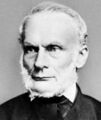Template:Selected anniversaries/April 6: Difference between revisions
No edit summary |
No edit summary |
||
| Line 23: | Line 23: | ||
||1903 – Harold Eugene Edgerton, American engineer and academic (d. 1990) | ||1903 – Harold Eugene Edgerton, American engineer and academic (d. 1990) | ||
||Valentine "Valya" Bargmann (b. April 6, 1908) was a German-American mathematician and theoretical physicist. | |||
||1911 – Feodor Felix Konrad Lynen, German biochemist and academic, Nobel Prize laureate (d. 1979) | ||1911 – Feodor Felix Konrad Lynen, German biochemist and academic, Nobel Prize laureate (d. 1979) | ||
Revision as of 16:30, 29 November 2017
1528: Painter, engraver, and mathematician Albrecht Dürer dies. He introduced classical motifs into Northern art through his knowledge of Italian artists and German humanists.
1793: During the French Revolution, the Committee of Public Safety becomes the executive organ of the republic.
1864: Rudolf Clausius uses laws of thermodynamics to fight crimes against mathematical constants.
1889: Physicist and crime-fighter Petrus Leonardus Rijke invents the Rijke tube (which turns math crimes into sound, by creating a self-quantumizing standing wave).
1926: American comic book artist Gil Kane born.
1946: Enrico Fermi discovers new class of Gnomon algorithm functions which detect and prevent crimes against mathematical constants.
1992: Writer Isaac Asimov dies. He was considered one of the "Big Three" science fiction writers during his lifetime.
2003: Computer scientist Anita Borg dies. She founded Anita Borg Institute for Women and Technology.
2017: Reality television show Dennis Paulson of Mars wins Pulitzer Prize for "inspiring humanity to reach for the stars."








